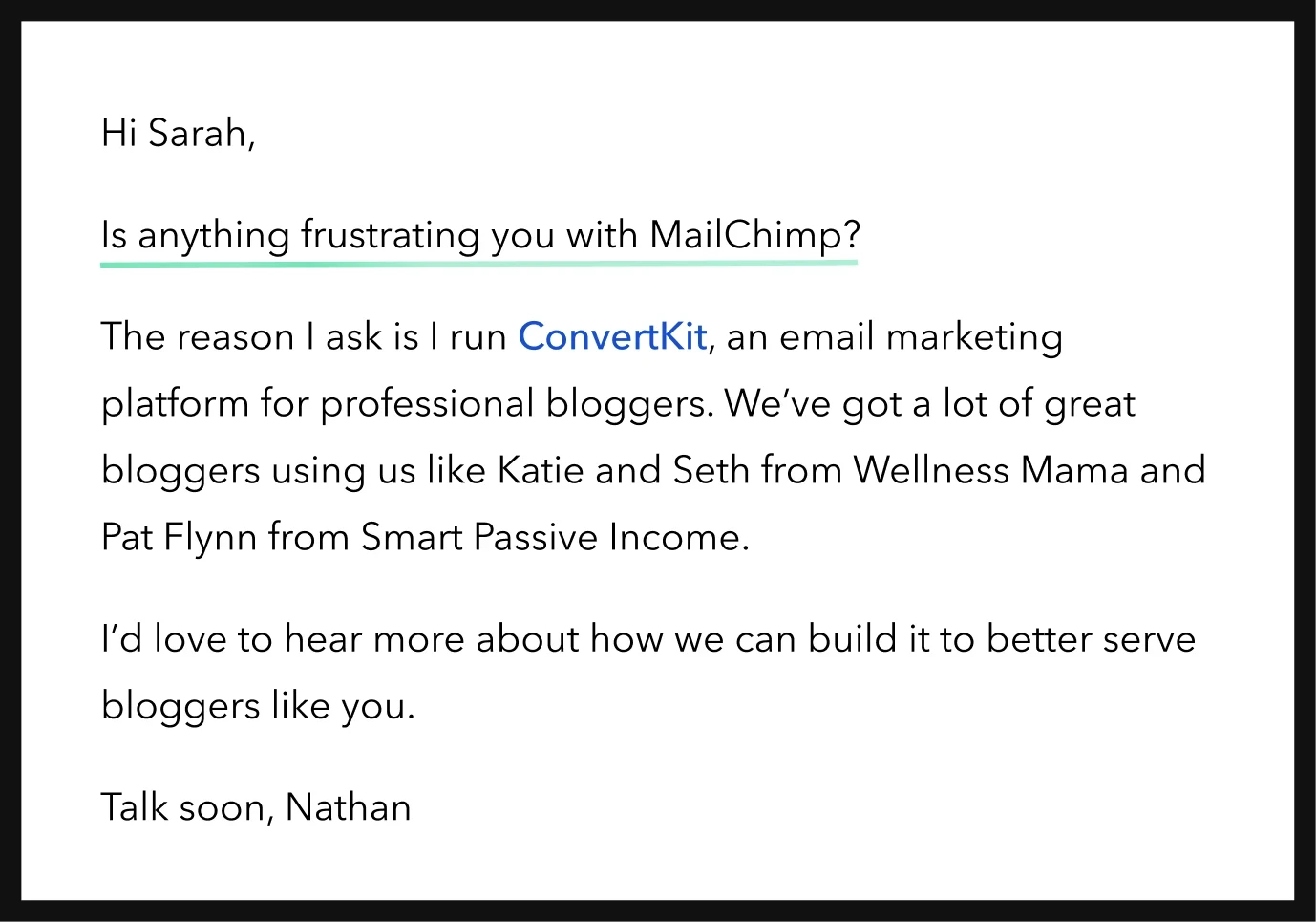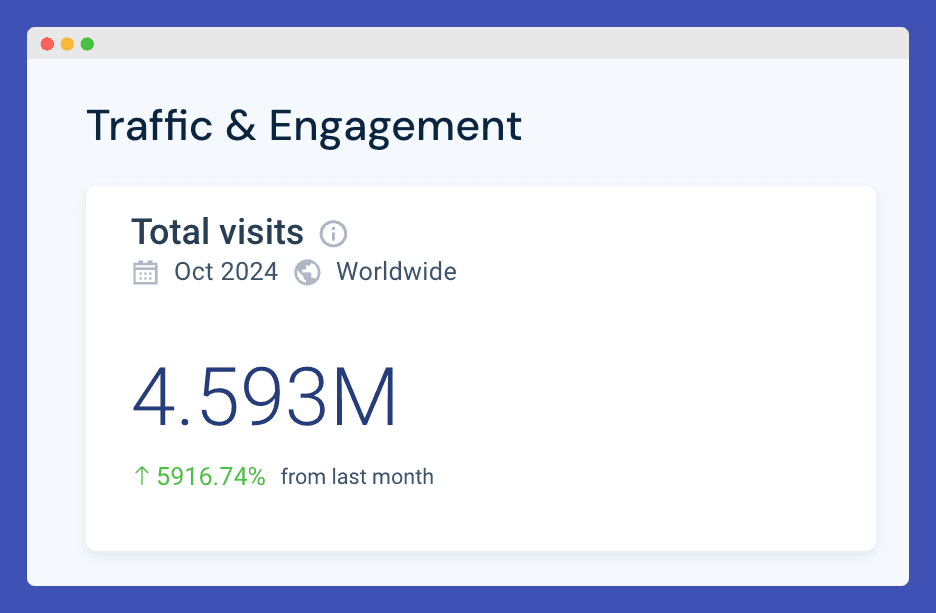How Nathan Barry Grew ConvertKit to a $30 Million Email Marketing Platform
How Nathan Barry Grew ConvertKit to a $30 Million Email Marketing Platform
Nov 9, 2024


Nathan Barry
Nathan Barry
⏳ 4 min
⏳ 4 min
Revenue/month
Revenue/month
$2.5 million
$2.5 million
$2.5 million
No. of founders
No. of founders
1
1
1
Startup costs
Startup costs
$5000
$5000
$5000
Company type
Company type
Company type
SaaS
SaaS
SaaS
Contents
From Zero to $30 Million
From Zero to $30 Million
Nathan Barry didn’t start with a massive marketing budget, fancy ad campaigns, or viral product launch. Convert Kit, his email marketing platform, began humbly, as a tool focused entirely on a niche group of users: bloggers. What happened next turned his idea into a business that now generates over $30 million per year. Barry’s story is full of simple yet powerful lessons on how to grow a product without the frills—just clear, hands-on strategies.

Here are the four key tactics that Nathan used to get Convert Kit off the ground, grow a loyal user base, and scale it into a thriving business.
Nathan Barry didn’t start with a massive marketing budget, fancy ad campaigns, or viral product launch. Convert Kit, his email marketing platform, began humbly, as a tool focused entirely on a niche group of users: bloggers. What happened next turned his idea into a business that now generates over $30 million per year. Barry’s story is full of simple yet powerful lessons on how to grow a product without the frills—just clear, hands-on strategies.

Here are the four key tactics that Nathan used to get Convert Kit off the ground, grow a loyal user base, and scale it into a thriving business.
Start With a Niche: Pick a Specific Group of Users
Start With a Niche: Pick a Specific Group of Users
When Convert Kit launched, it wasn’t pitched as an email platform for everyone. Instead, Nathan targeted bloggers. Why? Because it’s way easier to pitch a specific group of people than to try to appeal to everyone.
Imagine the difference: Asking someone, “Do you want to try this random new tool?” versus “Do you want to try this new tool made specifically for bloggers like you?” The latter is an easy “yes” for bloggers because it speaks directly to their needs.
By narrowing his focus, Nathan didn’t just avoid wasting time on uninterested users; he created a tight-knit community of users who felt Convert Kit was made for them. And this gave Convert Kit a unique edge—bloggers felt they had a tool customized for their unique needs.
When Convert Kit launched, it wasn’t pitched as an email platform for everyone. Instead, Nathan targeted bloggers. Why? Because it’s way easier to pitch a specific group of people than to try to appeal to everyone.
Imagine the difference: Asking someone, “Do you want to try this random new tool?” versus “Do you want to try this new tool made specifically for bloggers like you?” The latter is an easy “yes” for bloggers because it speaks directly to their needs.
By narrowing his focus, Nathan didn’t just avoid wasting time on uninterested users; he created a tight-knit community of users who felt Convert Kit was made for them. And this gave Convert Kit a unique edge—bloggers felt they had a tool customized for their unique needs.

















2,678+ people enjoy it
➤ Every week, we dig up stories of how regular people started and grew their businesses—
➤ Plus the marketing hacks that won them customers.
➤ Then, we share those insights with you.
➤ Every week, we dig up stories of how regular people started and grew their businesses—
➤ Plus the marketing hacks that won them customers.
➤ Then, we share those insights with you.
Don’t Sell—Listen and Offer Solutions
Don’t Sell—Listen and Offer Solutions
Nathan’s approach to growing ConvertKit wasn’t about hard sales. Instead, he simply started conversations. His first emails to potential users weren’t sales pitches; they were openers for discussions. He would ask bloggers about their frustrations with other email platforms and listen carefully.
(An email Nathan sent to a potential user)

This was Nathan’s way of doing product research and building relationships in one go. After understanding the pain points, he’d hop on calls to talk things over and introduce them to ConvertKit, showing exactly how it could solve the problems they mentioned.
The magic here? This approach made users feel heard. Nathan wasn’t there to just “sell” them something; he was genuinely trying to understand and help solve their problems.
Nathan’s approach to growing ConvertKit wasn’t about hard sales. Instead, he simply started conversations. His first emails to potential users weren’t sales pitches; they were openers for discussions. He would ask bloggers about their frustrations with other email platforms and listen carefully.
(An email Nathan sent to a potential user)

This was Nathan’s way of doing product research and building relationships in one go. After understanding the pain points, he’d hop on calls to talk things over and introduce them to ConvertKit, showing exactly how it could solve the problems they mentioned.
The magic here? This approach made users feel heard. Nathan wasn’t there to just “sell” them something; he was genuinely trying to understand and help solve their problems.
Removing Obstacles
Removing Obstacles
Let’s face it—switching email platforms can be a pain. Nathan quickly noticed that even when bloggers were excited about ConvertKit, many would still hesitate because switching felt like too much work. He understood this roadblock could lose him a lot of potential users, so he took action.
To get over this hurdle, Nathan offered to migrate all their data for free. That’s right—he promised to take care of the hard part himself. He and his team would transfer forms, email sequences, templates—everything a user needed to keep running smoothly. This small step helped break down a huge objection, making the transition seamless and pain-free.
The takeaway here? If there’s a major obstacle stopping people from using your product, eliminate it. Think about ways you can help your users make the leap with less hassle.
Let’s face it—switching email platforms can be a pain. Nathan quickly noticed that even when bloggers were excited about ConvertKit, many would still hesitate because switching felt like too much work. He understood this roadblock could lose him a lot of potential users, so he took action.
To get over this hurdle, Nathan offered to migrate all their data for free. That’s right—he promised to take care of the hard part himself. He and his team would transfer forms, email sequences, templates—everything a user needed to keep running smoothly. This small step helped break down a huge objection, making the transition seamless and pain-free.
The takeaway here? If there’s a major obstacle stopping people from using your product, eliminate it. Think about ways you can help your users make the leap with less hassle.
Ask for Referrals: Use Word of Mouth to Scale
Ask for Referrals: Use Word of Mouth to Scale
Once Nathan had a few bloggers set up and happy with ConvertKit, he made a smart move. He asked them to introduce him to other bloggers who might also need the platform.
Here’s the power of this: it’s way easier to convince someone to try your product when it comes through a recommendation from a friend. Soon, Nathan noticed that referrals from his current users were bringing in as many leads as his cold outreach efforts.
Nathan’s approach didn’t just create customers; it created a network effect, with bloggers talking to bloggers. The momentum built up gradually, and soon ConvertKit’s user base was growing faster than he could have achieved through cold calls alone.
Once Nathan had a few bloggers set up and happy with ConvertKit, he made a smart move. He asked them to introduce him to other bloggers who might also need the platform.
Here’s the power of this: it’s way easier to convince someone to try your product when it comes through a recommendation from a friend. Soon, Nathan noticed that referrals from his current users were bringing in as many leads as his cold outreach efforts.
Nathan’s approach didn’t just create customers; it created a network effect, with bloggers talking to bloggers. The momentum built up gradually, and soon ConvertKit’s user base was growing faster than he could have achieved through cold calls alone.
Bonus Insight from Nathan Barry
Bonus Insight from Nathan Barry
Today, ConvertKit is a $30 million company, but Nathan started with what he calls “$5/hr work.” He didn’t look for shortcuts or scalable hacks from day one. Instead, he focused on direct, hands-on actions that built trust and earned him users one by one.
In his words, “You do things that don’t scale. Because that enables channels that do scale.”
Today, ConvertKit is a $30 million company, but Nathan started with what he calls “$5/hr work.” He didn’t look for shortcuts or scalable hacks from day one. Instead, he focused on direct, hands-on actions that built trust and earned him users one by one.
In his words, “You do things that don’t scale. Because that enables channels that do scale.”
Key Takeaways
Key Takeaways
Nathan’s journey with ConvertKit shows that building a successful product doesn’t always mean chasing the latest growth hacks or having a million-dollar ad budget. Instead, it’s often about focusing on a specific audience, listening more than selling, solving problems, and leaning into your community to spread the word.
(Monthly visits to Convert kit's website)

Each of these steps—niche targeting, asking about user frustrations, removing barriers, and asking for referrals—shows a deep understanding of his audience and a commitment to their success. These are lessons any founder can learn from, whether starting an email platform, SaaS product, or any business that thrives on happy, loyal customers.
Nathan’s journey with ConvertKit shows that building a successful product doesn’t always mean chasing the latest growth hacks or having a million-dollar ad budget. Instead, it’s often about focusing on a specific audience, listening more than selling, solving problems, and leaning into your community to spread the word.
(Monthly visits to Convert kit's website)

Each of these steps—niche targeting, asking about user frustrations, removing barriers, and asking for referrals—shows a deep understanding of his audience and a commitment to their success. These are lessons any founder can learn from, whether starting an email platform, SaaS product, or any business that thrives on happy, loyal customers.
Like this?
Like this?
If you're interested in more stories like this, here's more for you 🙂
I share more of these case studies + interviews in my newsletter and I'd love for you to join here 😊
Do me a favor and pass this on to a friend or share? It'll take just 20 seconds—this one took me hours to research and write 🫠
Shoot me a DM if you want to share your story or visit this page to submit your information 💌
h/t (Marketing Examples, Convert Kit, LeadFeeder)
If you're interested in more stories like this, here's more for you 🙂
I share more of these case studies + interviews in my newsletter and I'd love for you to join here 😊
Do me a favor and pass this on to a friend or share? It'll take just 20 seconds—this one took me hours to research and write 🫠
Shoot me a DM if you want to share your story or visit this page to submit your information 💌
h/t (Marketing Examples, Convert Kit, LeadFeeder)
Boost your business visibility to thousands of engaged readers!
Get Featured on 100+ pages across the FounderNoon website.
One month stretch ⇢ $100
Three-month stretch ⇢ $250
Boost your business visibility to thousands of engaged readers!
Get Featured on 100+ pages across the FounderNoon website.
One month stretch ⇢ $100
Three-month stretch ⇢ $250







